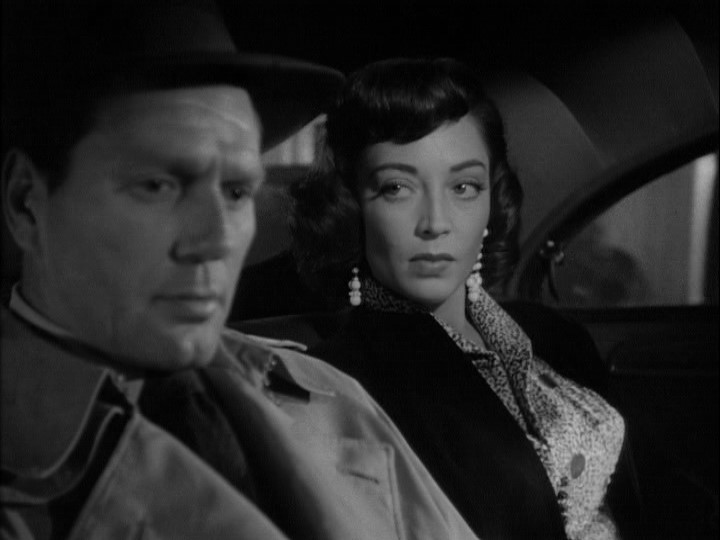 Revealed in the first moments of Richard Fleisher’s The Narrow Margin (1952) is a plot impossibility so contrived it almost makes the movie seem like one big train wreck. The story concerns police detective Walter Brown (Charles McGraw). who is assigned to escort Mrs. Frankie Neall (Marie Windsor), the wife of a recently murdered gangster, from Chicago to Los Angeles where she is to testify in court and identify key mob personnel. On the same train, however, is a pair of mob hit men with instructions to make sure the moll only leaves the train on a stretcher.
Revealed in the first moments of Richard Fleisher’s The Narrow Margin (1952) is a plot impossibility so contrived it almost makes the movie seem like one big train wreck. The story concerns police detective Walter Brown (Charles McGraw). who is assigned to escort Mrs. Frankie Neall (Marie Windsor), the wife of a recently murdered gangster, from Chicago to Los Angeles where she is to testify in court and identify key mob personnel. On the same train, however, is a pair of mob hit men with instructions to make sure the moll only leaves the train on a stretcher. Now, for the kicker: the hit men don’t know what the woman looks like—but they know what the cop looks like, so they’ll identify her that way. Talk about un-organized crime: she’s the wife of someone in their own racket, yet they don’t know what she looks like, and are unable to find a photograph of her. They even know where she lives, because in the opening scene they arrive at her apartment to knock her off; a gunfight with her police escorts results only in the death of Brown’s partner. This impossibility wouldn’t be so onerous if it were not reiterated every few minutes, or play such a big role in the plot—and there’s even a “mistaken identity’ plot twist waiting for you at the end of the line, and it’s a real doozy.
 Almost, but not quite, a train wreck. The collaboration between director Fleisher and cinematographer George Diskant is the best part of the movie: the narrow confines of the train are realistically created, as well as highly affecting. There is a physical constraint that emanates and infuses the suspenseful plot with even greater anxiety. During the fights and chases, the camera is in such close quarters with the actors that it seems as though a collision is inevitable.
Almost, but not quite, a train wreck. The collaboration between director Fleisher and cinematographer George Diskant is the best part of the movie: the narrow confines of the train are realistically created, as well as highly affecting. There is a physical constraint that emanates and infuses the suspenseful plot with even greater anxiety. During the fights and chases, the camera is in such close quarters with the actors that it seems as though a collision is inevitable. The script, written by Earl Felton from a story by Martin Goldsmith and Jack Leonard, is a mixed bag of half-baked plot and hardboiled dialogue, the sort that has become indicative of the whole film noir genre. Lines like, “She’s a 60-cent special: cheap, flashy, and strictly poison under the gravy,” are some of the highlights of the movie. Actually, that line is pretty classic, and ranks up among some of the best hardboiled quotes.
 The actors do their best, given the incredible senselessness of their characters. Marie Windsor, especially, seems to have gotten the short end of the stick: as the femme fatale, Mrs. Frankie Neall's only weapon is her stupidity, and she seems to be a threat only to her own safety. Charles McGraw plays Walter Brown the way Dana Andrews might: monotone, with few vocal inflections. McGraw delivers lines like, “Mrs. Neall, I’d like to give you the same answer I gave that hood—but it would mean stepping on your face,” the way a hardboiled detective should.
The actors do their best, given the incredible senselessness of their characters. Marie Windsor, especially, seems to have gotten the short end of the stick: as the femme fatale, Mrs. Frankie Neall's only weapon is her stupidity, and she seems to be a threat only to her own safety. Charles McGraw plays Walter Brown the way Dana Andrews might: monotone, with few vocal inflections. McGraw delivers lines like, “Mrs. Neall, I’d like to give you the same answer I gave that hood—but it would mean stepping on your face,” the way a hardboiled detective should.

1 comment:
hi, just watching a noir box set, doing a bit of googling. Found your site. Thought your comments looked lonely. Will revisit your site soon.
Post a Comment